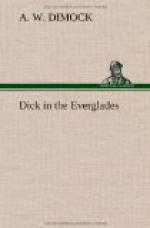Ned turned to the Indian and pointing to the steaming pot, said:
“Nar-kee? (What is it?)”
“Lock-a-wa. (Turtle.)”
“Esoka bonus che. (I want some.)”
“Humbuggus cha. (Come eat.)”
The boys took turns with the big, wooden, family spoon and found the mess very good. There was another kettle of which the Indians ate freely into which Dick dipped his spoon. He made a wry face as he swallowed the portion he had scooped up and said to Ned:
“Tell your copper-faced friend that he had better give that swill back to the pigs he stole it from.”
“Be careful, Dick, he understands.”
“Then let him say so in a decent language and I’ll apologize for hurting his feelings, but I won’t say that stuff is fit to eat, not if I am tied to the stake.”
Dick spent one afternoon getting acquainted with the Indian children, in which he succeeded so well that when he came back to the camp streaming with water, the whole bunch, although they were quite as well soaked as he, followed him screaming with laughter, quite like white children.
“What is the trouble?” inquired Ned as soon as the youngsters gave him a chance to be heard.
“Only the usual thing. These Indians don’t know how to manage their roly-poly canoes and I’m afraid I’ll be drowned before I get ’em taught.”
Dick had found a big family canoe that looked as if it couldn’t capsize and had made signs to an Indian boy to go out in it with him. Before they were fairly afloat all the pickaninnies belonging to the camp had piled into the craft. From the smallest squab to the biggest boy, the Indian children danced about in the canoe without disturbing its equilibrium. The boy in the stern, standing on the extreme point of the craft, set his pole on the coral bottom and threw his weight back upon it until his whole body stood out almost parallel with the water behind the canoe. Dick stood on the tiny deck on the bow of the boat, but with every thrust of his pole the canoe wabbled till the pickaninnies balanced it. But Dick improved with practice and as he grew confident, threw his weight on the pole in true Seminole fashion. He would have pulled through with credit, but for the slipping of his pole on a point of coral rock, when he fell heavily in the water, capsizing the craft as he went overboard. At first the boy was alarmed for the safety of his cargo of children, but soon saw that they were as much at home in the water as on land and were quite capable of caring for themselves. After Ned had heard what had happened he called the attention of the squaws to the ducking of their babies without causing the faintest gleam of interest to cross their stolid faces.
After another day of eating with the Seminoles and sleeping on their tables, Dick announced that Tom and he were tired of Injuns and wanted to light out. The whole Indian family saw them off, even the squaws coming half way to the canoe from their camp. Dick carried Tom on his shoulder and the lynx stepped into the canoe as if it had always owned it and curled up on the canvas of the tent.




